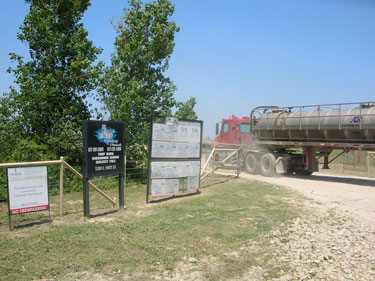Those concerned about the dangers posed to Texas groundwaters by gas drilling waste got bad news a few weeks ago. The state’s highest civil court ruled that the Texas Railroad Commission doesn’t need to consider anything but the needs of the industry in deciding whether to grant permits for injection wells.
Those are the wells in which millions of gallons of highly toxic drilling waste are shot at high pressure into strata far below the aquifers that provide both public drinking water supplies and private well water. It’s a technology that the industry claims is safe, but well casings breaking underground have poisoned aquifers and ruined drinking water from Pennsylvania to Colorado to Texas. Additionally, surface spills at injection well sites have ignited and caused several major explosions, killed hundreds of animals that drank the toxic waste, and at least temporarily poisoned rivers in various places around the country.
 The Texas Supreme Court decision in March stemmed from a lawsuit filed six years ago by a Wise County activist group, called Texas Citizens for A Safe Future and Clean Water, against the Texas Railroad Commission, which oversees the state’s oil and gas production and also the industry’s waste disposal practices.
The Texas Supreme Court decision in March stemmed from a lawsuit filed six years ago by a Wise County activist group, called Texas Citizens for A Safe Future and Clean Water, against the Texas Railroad Commission, which oversees the state’s oil and gas production and also the industry’s waste disposal practices.
In an admission that made environmentalists’ and drilling activists’ heads swim, the Railroad Commission said that in carrying out its mandate to protect the “public interest,” insofar as the oil and gas industry is concerned, the public interest is in keeping wells producing — and nothing else. No other factors need be considered.
Texas Citizens and their de facto leader, Jim Popp, wanted the interests of the actual public — that is, citizens living nearby — considered as well. A first-level appellate court agreed, but not the Supreme Court.
“What this decision means for neighbors and citizens affected by these wells is that they’ll have even less control over the impact of the wells on their lives than they previously had,” said David Frederick, lead attorney for Texas Citizens. “We obviously feel the court misruled on the case.”
The story began when Popp and his neighbors in a rural area 15 miles northeast of Decatur received a notice from the commission that a company called Pioneer Exploration Ltd had purchased an abandoned gas well in their neighborhood and was asking for a permit to turn it into a commercial injection well.
“Commercial injection wells can operate all day and all night,” said Popp, “and they can take waste material from any gas or oil drilling site. It just didn’t make sense to have one out where we live, what with our narrow country roads, blind turns, and the risk of spillage to our livestock.”
Popp and his neighbors insist that they are not against drilling. “And we understand the need to dispose of the waste produced by drilling. But we are for the public interest in doing it in the safest possible way,” he said. They objected to the well on three counts, including the danger posed by the heavy traffic in huge tank trucks that would be driving down narrow country roads 24 hours a day to service the site.
“We’ve got kids on bicycles out here, we’ve got neighbors who walk on the roads in the evenings, and we’ve got blind curves. It’s just not safe,” Popp said.
The group also opposed the permit on health grounds, because of the very real possibility of spills of poisonous materials winding up in groundwater or evaporating into the air they were breathing.
Their third objection, Popp said, was that Pioneer had lied on its application about whether the disposal site was as far from the nearest active well as the Commission required.
“That should have been the end of the story,” he said.
It wasn’t. The Railroad Commission held hearings and fined the company $500 — but then granted Pioneer a waiver on the distance requirement.
A state district court judge ruled that the commission had acted within the law in deciding what factors to consider regarding the “public interest.”
“Well, we were the public, and we didn’t feel the public interest was being served,” said Cecile Carson, whose home served as the meeting place for the Texas Citizens group. “I’m surprised at how naïve I was to think that this didn’t all boil down to the Railroad Commission’s interpretation of public interest — which in their view is what’s best for the oil and gas industry.”
They appealed, and Texas’ 3rd Court of Appeals ruled unanimously in December 2007 for the citizens group on the public interest question. The four-judge panel found that the Railroad Commission had interpreted “the public interest” too narrowly. The court sent the case back to the Railroad Commission for reconsideration under a broader definition.
“With that unanimous decision in our favor, I really thought we had set good new law in Texas,” Popp said.
The Railroad Commission was having none of it. “Rather than reconsidering the case, the Railroad Commission appealed the ruling to the Texas Supreme Court,” said Frederick, the citizen group’s attorney.
In March of this year, the Supreme Court overturned the appellate court decision, ruling that the commission was not forced to consider a wider definition of public interest.
The justices acknowledged that the commission’s definition was very narrow and that the term itself was vague. But as long as a state agency had been consistent in assigning a meaning to a vague term, the agency’s definition could stand, they ruled.
Texas Citizens has filed for a rehearing. Marisa Perales, an attorney who worked with Frederick on the lawsuit, said the chances of being granted a rehearing are slim. “It appears the court has made up their minds on what the law is as regards public interest,” she said. “And if they don’t change their idea on that, it will be up to the legislature to change the laws.”
Texas Citizens member Jimmy Johnson said he was disappointed at the decision. The abandoned gas well that Pioneer wants to turn into a waste injection well theoretically was drilled deeper than the Trinity and Paluxy aquifers from which he and his neighbors get their water. “But if they put too much pressure on it will it blow out? And if it does, how badly will it affect those aquifers? The Railroad Commission doesn’t seem to care,” he said.
Before he moved to his current home 11 years ago, Johnson said, he lived on the opposite side of Decatur. Shortly after an injection well was drilled near his house, his well water started “smelling so bad that I had to put a filtration system on it,” he said.
Pioneer has not started operating its disposal well yet. But Johnson is afraid that when the company opens it for business, the same thing will happen.
Popp said he believes that the campaign money handed out so liberally by the gas industry is the real reason for the Railroad Commission’s stance and for the Texas Legislature’s failure to bring about change in the commission’s practices.
“There are some excellent legislators out there, but most of them have simply been bought by campaign funding,” he said.
Even if Pioneer does begin operating the site as a commercial disposal well, Carson said, “I will tell you now that the fight was worth it. We did not lay down and roll over.”











